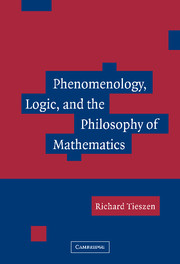Book contents
- Frontmatter
- Contents
- Acknowledgments
- Introduction: Themes and Issues
- PART I REASON, SCIENCE, AND MATHEMATICS
- PART II KURT GÖDEL, PHENOMENOLOGY, AND THE PHILOSOPHY OF MATHEMATICS
- 4 Kurt Gödel and Phenomenology
- 5 Gödel's Philosophical Remarks on Logic and Mathematics
- 6 Gödel's Path from the Incompleteness Theorems (1931) to Phenomenology (1961)
- 7 Gödel and the Intuition of Concepts
- 8 Gödel and Quine on Meaning and Mathematics
- 9 Maddy on Realism in Mathematics
- 10 Penrose on Minds and Machines
- PART III CONSTRUCTIVISM, FULFILLABLE INTENTIONS, AND ORIGINS
- Bibliography
- Index
6 - Gödel's Path from the Incompleteness Theorems (1931) to Phenomenology (1961)
Published online by Cambridge University Press: 14 July 2009
- Frontmatter
- Contents
- Acknowledgments
- Introduction: Themes and Issues
- PART I REASON, SCIENCE, AND MATHEMATICS
- PART II KURT GÖDEL, PHENOMENOLOGY, AND THE PHILOSOPHY OF MATHEMATICS
- 4 Kurt Gödel and Phenomenology
- 5 Gödel's Philosophical Remarks on Logic and Mathematics
- 6 Gödel's Path from the Incompleteness Theorems (1931) to Phenomenology (1961)
- 7 Gödel and the Intuition of Concepts
- 8 Gödel and Quine on Meaning and Mathematics
- 9 Maddy on Realism in Mathematics
- 10 Penrose on Minds and Machines
- PART III CONSTRUCTIVISM, FULFILLABLE INTENTIONS, AND ORIGINS
- Bibliography
- Index
Summary
In a lecture manuscript written around 1961 (Gödel *1961/?), Gödel describes a philosophical path from the incompleteness theorems to Husserl's phenomenology. It is known that Gödel began to study Husserl's work in 1959 and that he continued to do so for many years. During the 1960s, for example, he recommended the Sixth Investigation of Husserl's Logical Investigations to several logicians for its treatment of categorial intuition (Wang 1996, p. 164). Although Gödel may not have been satisfied with what he was able to obtain from philosophy and Husserl's phenomenology, he nonetheless continued to recommend Husserl's work to logicians as late as the 1970s. In this chapter I present and discuss the kinds of arguments that led Gödel to the work of Husserl. This should help to shed additional light on Gödel's philosophical and scientific ideas and to show to what extent these ideas can be viewed as part of a unified philosophical outlook. Some of the arguments that led Gödel to Husserl's work are only hinted at in Gödel's 1961 paper; they are developed in much more detail in Gödel's earlier philosophical papers (see especially 1934, *193?, 1944, 1947, *1951, *1953/59). In particular, I focus on arguments concerning Hilbert's program and an early version of Carnap's program.
Some Ideas from Phenomenology
Since Husserl's work is not generally known to mathematical logicians, a brief mention of a few details about his background may be helpful. Husserl received his doctorate in mathematics in 1883 with a thesis on the calculus of variations.
Information
- Type
- Chapter
- Information
- Phenomenology, Logic, and the Philosophy of Mathematics , pp. 125 - 148Publisher: Cambridge University PressPrint publication year: 2005
